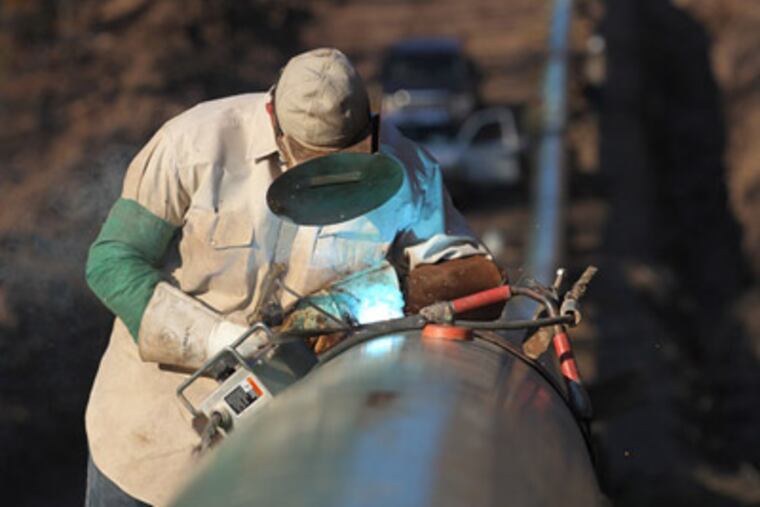Inquirer Editorial: Pipelines need a watchful eye
No one should fault Pennsylvanians living amid the state's natural-gas boom for finding it deeply troubling that the miles and miles of pipeline being strung across their communities will never see a government inspector.

No one should fault Pennsylvanians living amid the state's natural-gas boom for finding it deeply troubling that the miles and miles of pipeline being strung across their communities will never see a government inspector.
An Inquirer review for a four-part series concluding Sunday found that many of these pipeline networks, by law, are subject to fewer safety checks than in any other state.
Due to a gap in federal rules, the feeder pipelines from hundreds of wells being sunk into the rich Marcellus Shale gas fields are exempt from oversight by the undermanned federal agency that enforces pipeline standards.
Where pipelines run near sparsely populated areas, the Pipeline and Hazardous Materials Safety Administration relies on the pipeline industry to meet safety standards - rather than performing its own inspections.
Under these standards, in place for several decades, the thinking is that few people are put at risk by a pipeline explosion in these largely rural areas. Meanwhile, the pipeline operators are supposed to have a financial incentive to properly install and maintain their lines so that gas - and profits - flow uninterrupted.
Without question, it's good to hear major operators boast of state-of-the-art pipes and safeguards. But communities they serve have only the word of these firms to go on.
Not surprisingly, residents in rural parts of the state only now coming to grips with the impacts of the Marcellus boom see an injustice in rules that offer greater protection to suburban and city folks - as if different values can be placed on life depending upon where people live. (In this region, by contrast, residents are accustomed to seeing Philadelphia Gas Works and Peco Energy Co. crews spring into action at the slightest whiff of leaking gas.)
That's unlikely to change soon, even as Congress moves forward on pipeline safety legislation that will add a handful of inspectors nationwide, subject older pipelines to new scrutiny, and double violation fines to $2 million.
In fact, a Pennsylvania congressman is working against the idea that feeder pipelines should get government oversight. As chairman of a U.S. House subcommittee whose purview includes pipelines, Rep. Bill Shuster (R., Pa.) espouses a "more with less" approach to federal pipeline safety regs.
That may best spur the state's gas boom, but it cannot help but sow unease in communities where - thanks, in part, to growth triggered by the boom - more and more people will be living near unregulated pipelines.